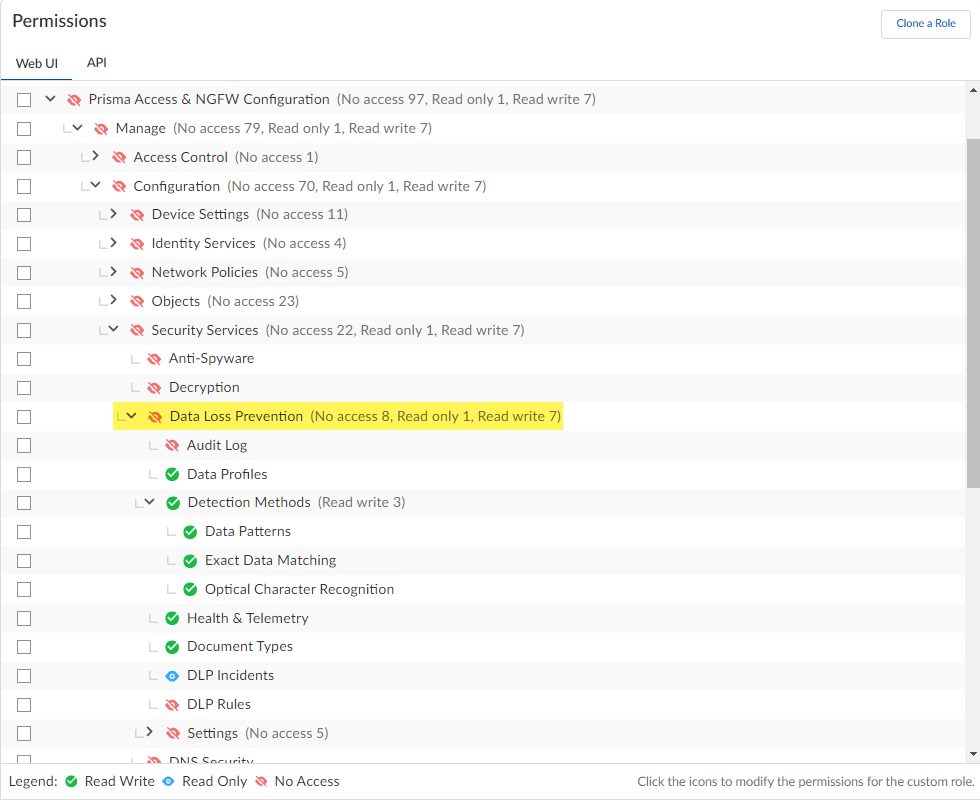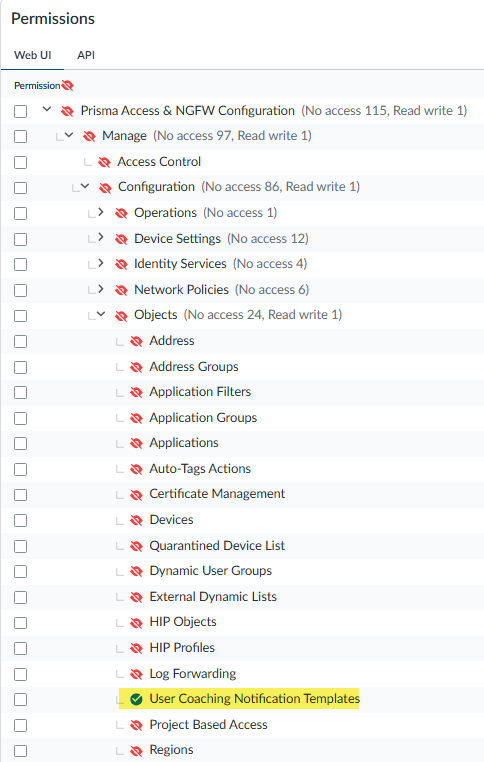Enterprise DLP
Strata Cloud Manager
Table of Contents
Expand All
|
Collapse All
Enterprise DLP Docs
Strata Cloud Manager
Configure role-based access for Enterprise Data Loss Prevention (E-DLP) on Strata Cloud Manager.
Strata Cloud Manager supports the following roles to grant access privileges for the
Enterprise DLP app specifically. Review the predefined roles and permissions available
on Strata Cloud Manager for details.
|
Predefined Role
|
Privileges
|
|---|---|
|
Data Security Admin
For All Apps & Services
|
Full read and write to Enterprise DLP and Data Security (SaaS API).
This role also includes access to Strata Logging Service logs,
dashboards, create custom dashboards, and download, share, and
schedule reports. Includes read-only access to logs. This role
includes a small subset of privileges included in the Security
Admin role. Assign this role to administrators who manage only
decryption rule configurations.
|
|
DLP Incident Manager
For Enterprise DLP only
|
Read and Write Access — Data Risk dashboard
and settings, Data Asset Explorer,
Incidents, Health & Telemetry, Audit Logs
Read Only Access—Data patterns, profiles, DLP Rules, EDM
data sets, OCR setting, and all DLP settings
|
|
DLP Policy Manager
For Enterprise DLP only
|
Read and Write Access — Data patterns, profiles, DLP
Rules, EDM data sets, OCR setting, health and telemetry, audit
logs, alerts, and all DLP settings
No Access— Incidents and reports
|
|
Multitenant Superuser
For All Apps & Services or Enterprise DLP
|
Full read and write privileges to Enterprise DLP for all
tenants in the particular multitenant hierarchy where the role
is assigned
|
|
Superuser
For All Apps & Services or Enterprise DLP
|
Full read and write privileges for Enterprise DLP
|
|
View Only Administrator
For All Apps & Services or Enterprise DLP
|
Read-only privileges for Enterprise DLP
|
- Log in to Strata Cloud Manager.Use one of the various ways to access Identity & Access.Add Access to your tenant where Enterprise DLP is active.This step is required only if the user for which you’re granting Enterprise DLP access isn’t already registered with the Palo Alto Networks Customer Support Portal (CSP).Select Prisma Access & NGFW ConfigurationManageConfigurationSecurity ServicesData Loss Prevention and configure the custom role.You can use custom roles allow to define which permissions are enforced for your users and allow more granular access control to Enterprise DLP than predefined roles.The access permissions applied to the Data Loss Prevention parent node determines the lowest access privilege you can assign to any of its child nodes. For example, if you want to provide No Access and Read Only to some areas of Enterprise DLP, you must first assign No Access to the Enterprise DLP application.Below is an example of a custom Enterprise DLP role. The custom role is configured with no access privileges to Audit Logs or any of the Enterprise DLP settings. However, read-only access is configured for the Health & Telemetry and DLP Incidents, and full read and write privileges are configured for Data Profiles, all Detection Methods, Document Types, and DLP Rules.
- Enterprise DLP RBAC MappingThe mapping below maps the Enterprise DLP RBAC permissions to the Enterprise DLP configuration in Strata Cloud Manager.Review the list of predefined Enterprise DLP roles to grant a user access to the Data Risk and Data Asset Explorer dashboards.
- Audit Log—ConfigurationData Loss PreventionAudit Log
- Data Profiles—ConfigurationData Loss PreventionData Profiles
- Detection Methods—All detection methods in ConfigurationData Loss PreventionDetection Methods
- Data Patterns—ConfigurationData Loss PreventionDetection MethodsData Patterns
- Exact Data Matching—ConfigurationData Loss PreventionDetection MethodsExact Data Matching
- Optical Character Recognition—ConfigurationData Loss PreventionDetection MethodsOptical Character Recognition
- Health & Telemetry—ConfigurationData Loss PreventionHealth & Telemetry
- Document Types—ConfigurationData Loss PreventionDocument Types
- DLP Incidents—ConfigurationData Loss PreventionDLP Incidents
- DLP Rules—ConfigurationData Loss PreventionDLP Rules
- Settings—All Enterprise DLP settings in ConfigurationData Loss PreventionSettings
- Alerts—ConfigurationData Loss PreventionSettingsAlerts
- API Tokens—N/A; deprecated.
- Data Filtering—N/A; deprecated.
- Data Transfer—ConfigurationData Loss PreventionSettingsData Transfer
- Sensitive Data—ConfigurationData Loss PreventionSettingsSensitive Data
![]() Configure access privileges to allow a data security administrator to create End User Coaching notification templates.End User Coaching enables Enterprise DLP to display notifications to your end users when they generate an Enterprise DLP or Endpoint DLP incident. The end user notification template defines which DLP rules generate a notification and the contents of the notification.Select Prisma Access & NGFW ConfigurationManageObjects and configure the access privileges for User Coaching Notification Templates.
Configure access privileges to allow a data security administrator to create End User Coaching notification templates.End User Coaching enables Enterprise DLP to display notifications to your end users when they generate an Enterprise DLP or Endpoint DLP incident. The end user notification template defines which DLP rules generate a notification and the contents of the notification.Select Prisma Access & NGFW ConfigurationManageObjects and configure the access privileges for User Coaching Notification Templates.![]() Assign role-based access for Enterprise DLP.You don’t need to configuring a tenant role for a user if access to only Enterprise DLP is required.
Assign role-based access for Enterprise DLP.You don’t need to configuring a tenant role for a user if access to only Enterprise DLP is required.- Select User and for the Identity Address, enter the email address for which you granted access in the previous step.


